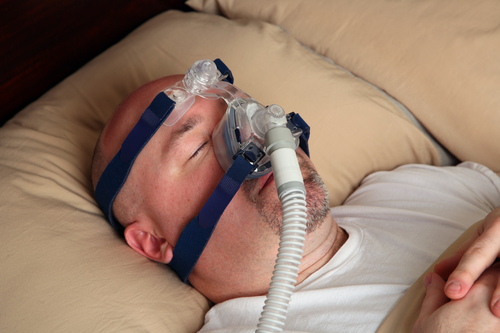11 September, 2023
People suffering with obstructive sleep apnoea (OSA) can reduce their risk of dying
from cardiovascular disease if they use a continuous positive airway pressure (CPAP) machine at
night, according to research presented at the European Respiratory Society International Congress in
Milan, Italy [1].
CPAP may also work better than a weight loss drug in reducing the build-up of plaque in the arteries
around the heart, according to a pilot study also presented at the European Respiratory Society
International Congress [2].
People with OSA often snore loudly, their breathing starts and stops during the night, and they may
wake up several times. This can lower the amount of oxygen in the blood and cause tiredness. It can
also increase the risk of high blood pressure, stroke, heart disease and type 2 diabetes.
CPAP machines are offered to people with OSA to help them sleep better. They work by blowing air
through a face mask throughout the night to prevent the user’s airways from closing. However,
research on the effects of CPAP on cardiovascular disease has produced mixed results.
The heart disease study was presented by Dr Jordi de Batlle from Institut de Recerca Biomèdica de
Lleida (IRBLleida), Lleida, Spain. He and his colleagues tracked down all 3,638 OSA patients living in
Catalonia who had chosen to stop using CPAP in 2011. They compared these to a similar group of
3,638 OSA patients who continued to use CPAP until at least 2015 or until death.
When they compared the two groups, they found that those who continued to use CPAP had a 40%
lower risk of dying by any cause, a 36% lower risk of dying from cardiovascular disease and an 18%
lower risk of being hospitalised with cardiovascular disease.
Dr de Batlle said: “Our results suggest that CPAP treatment can help most OSA patients by
preventing cardiovascular problems such as heart disease and stroke. This is a plus, as CPAP
treatment already helps most OSA patients by reducing sleepiness and improving their quality of life.
Based on these findings, we should encourage people with OSA to keep using their CPAP machines.”
The pilot study was presented by Dr Cliona O’Donnell, a specialist registrar in respiratory medicine at
St. Vincent’s University Hospital and University College Dublin, Ireland. She and her colleagues
conducted a study with 30 patients suffering from OSA who underwent a computerised tomography
(CT) coronary angiogram to assess any signs of narrowing in the blood vessels that supply the heart.
The patients were then randomly assigned to 24 weeks of treatment either using a CPAP machine at
night, or injections with weight loss drug liraglutide, or both together.
Patients who showed signs of coronary artery disease in their first scan underwent a repeat scan at
the end of the 24 weeks of treatment. Researchers used an artificial intelligence program to analyse
the patients’ scans.
The patients who were treated with CPAP and those treated with CPAP and weight loss injections
experienced reductions in the plaque build-up in their arteries and a reduction of inflammation in
their aorta (the main artery that carries blood from the heart to the rest of the body). Patients who
were treated with weight loss injections only did not experience these effects.
Dr O’Donnell said: “Continuous positive airway pressure works by keeping patients’ airways open
while they sleep. This stops fluctuations in oxygen levels in the blood that can exacerbate
cardiovascular disease.
“Although this is a pilot study, meaning we cannot draw firm conclusions, we found improvements in
some early signs of cardiovascular disease with CPAP treatment. This should now be further
evaluated in larger studies.”
Professor Sophia Schiza, who is secretary of the European Respiratory Society’s group assembly on
sleep-disordered breathing and was not involved in the research, says: “We know that people with
obstructive sleep apnoea are at a higher risk of cardiovascular problems, but there are conflicting
data on the effects of CPAP on reducing this risk. However, research using real world data is showing
that CPAP adherence is one of the key predictors for reducing cardiovascular risk and for better
outcomes in general. Here we have two studies: one large study showing that CPAP could help lower
the risk of developing or dying from cardiovascular disease in people suffering with OSA and another
small study suggesting that CPAP could be more beneficial than weight-loss therapy for people
suffering from OSA.
“OSA is an extremely common disease, with consequences for people’s daytime functioning and the
health of their hearts, blood vessels and metabolism. One of the treatment options is CPAP, and the
more the patients use CPAP every night, the greater the reduction in cardiovascular illness and
death. Therefore, there is a need for individualised treatment plans, patient engagement,
educational activities and close treatment follow-up in order to increase adherence to long-term
treatment and improve outcomes for patients.”
[1] Abstract no: OA3290 “Impact of CPAP treatment on cardiovascular outcomes: a Catalan nationwide database analysis”, by Jordi de Batlle et al; Presented in session, “Positive airway pressure for sleep-disordered breathing: adherence and outcomes” at 15:45-17:00 CEST on Monday 11 September 2023.
https://k4.ersnet.org/prod/v2/Front/Program/Session?e=379&session=16589
[2] Abstract no: OA3287 “The effect of CPAP therapy on coronary artery plaque volume in obstructive sleep apnoea: data from a proof-of-concept study”, by Cliona O’Donnell et al; Presented in session, “Positive airway pressure for sleep-disordered breathing: adherence and outcomes” at 15:45-17:00 CEST on Monday 11 September 2023.
https://k4.ersnet.org/prod/v2/Front/Program/Session?e=379&session=16589
